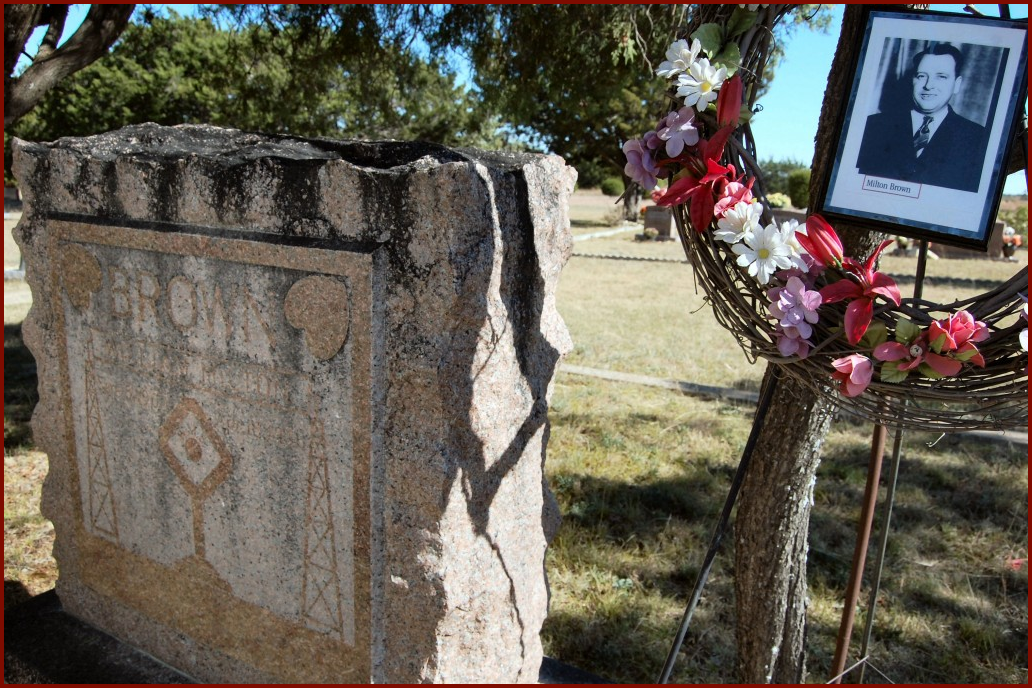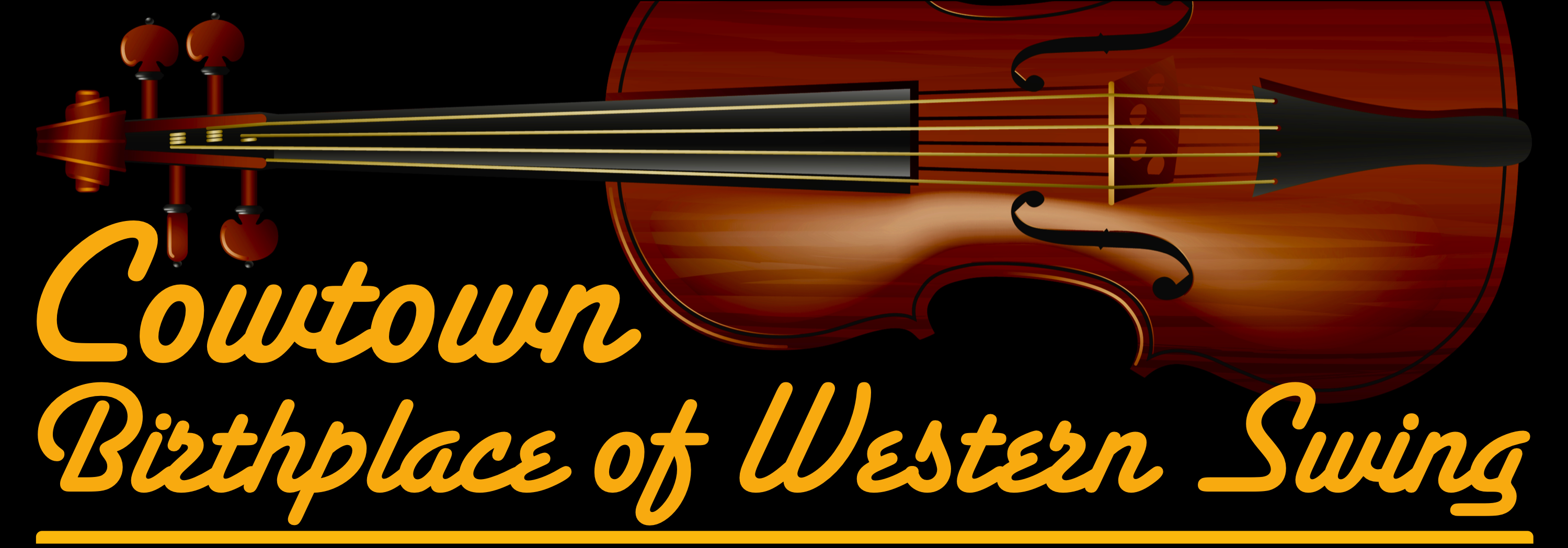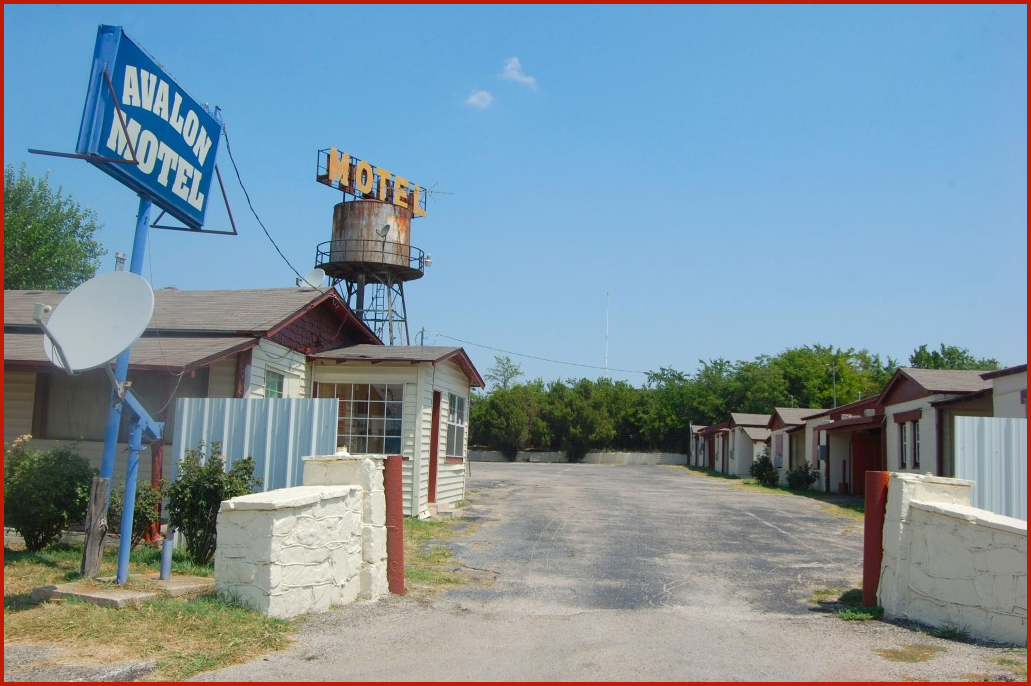
Milton Brown
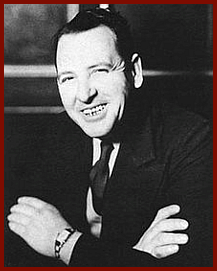 Milton Brown (September 7, 1903--April 18, 1936) was an
American band leader and vocalist who co-founded the genre of Western swing. His band was the first to fuse hillbilly hokum, jazz, and pop
together into a unique, distinctly American hybrid, that would five decades after his death, rightfully honor him the title of, "The Father
of Western Swing". The birthplace of Brown's upbeat hot-jazz string band was developed at the Crystal Springs Dance Hall in Fort Worth,
Texas from 1931 to 1936. Along with Bob Wills, whom he performed with at the beginning of this career, Brown developed the sound and style
of Western Swing in the early 1930s; and for a while he and his band, the Musical Brownies, were much more popular than the Texas Playboys.
Brown's career was sadly cut short in 1936 when he died from injuries sustained in a car accident, just as he was poised to break into
national stardom.
Milton Brown (September 7, 1903--April 18, 1936) was an
American band leader and vocalist who co-founded the genre of Western swing. His band was the first to fuse hillbilly hokum, jazz, and pop
together into a unique, distinctly American hybrid, that would five decades after his death, rightfully honor him the title of, "The Father
of Western Swing". The birthplace of Brown's upbeat hot-jazz string band was developed at the Crystal Springs Dance Hall in Fort Worth,
Texas from 1931 to 1936. Along with Bob Wills, whom he performed with at the beginning of this career, Brown developed the sound and style
of Western Swing in the early 1930s; and for a while he and his band, the Musical Brownies, were much more popular than the Texas Playboys.
Brown's career was sadly cut short in 1936 when he died from injuries sustained in a car accident, just as he was poised to break into
national stardom.
William Milton Brown was born in Stephenville, Texas, on September 8, 1903, the son of B. L. "Barty" and Martha Annie (Hueford) Brown. Milton's parents were cotton sharecroppers who were determined that Milton and his older sister, Era Lee, would get an education and not spend their lives in the cotton fields. Milton and Era attended the Smith Springs school just outside Stephenville. Both were good and popular students who showed a talent for singing at an early age.
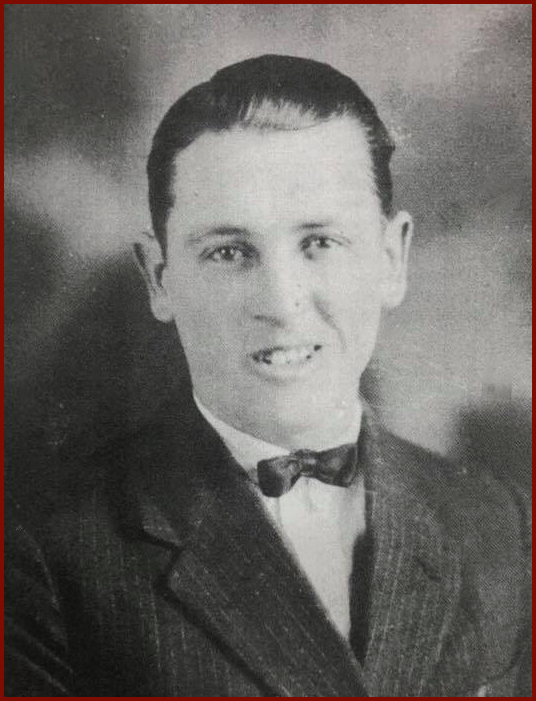 Stephenville's entertainment center, known as the Jokey Yard, served as a marketplace as well as performance venue for the traveling
medicine shows that came to town. The tent-show patter and musical numbers performed there likely influenced the stage presence Brown
later developed. His early vocal repertoire included church songs and sentimental ballads learned at home.
Stephenville's entertainment center, known as the Jokey Yard, served as a marketplace as well as performance venue for the traveling
medicine shows that came to town. The tent-show patter and musical numbers performed there likely influenced the stage presence Brown
later developed. His early vocal repertoire included church songs and sentimental ballads learned at home.
In September 1915 a second son, Melvin Derwood, was born to the Brown family, and then in May 1918, his sister Era died by a sudden illness. Devastated by her death, the family moved to Fort Worth a few months later. They settled on the city's west side close to the Bain Peanut Company, where Barty found work. Another son, Roy Lee, was born in Fort Worth in February 1921.
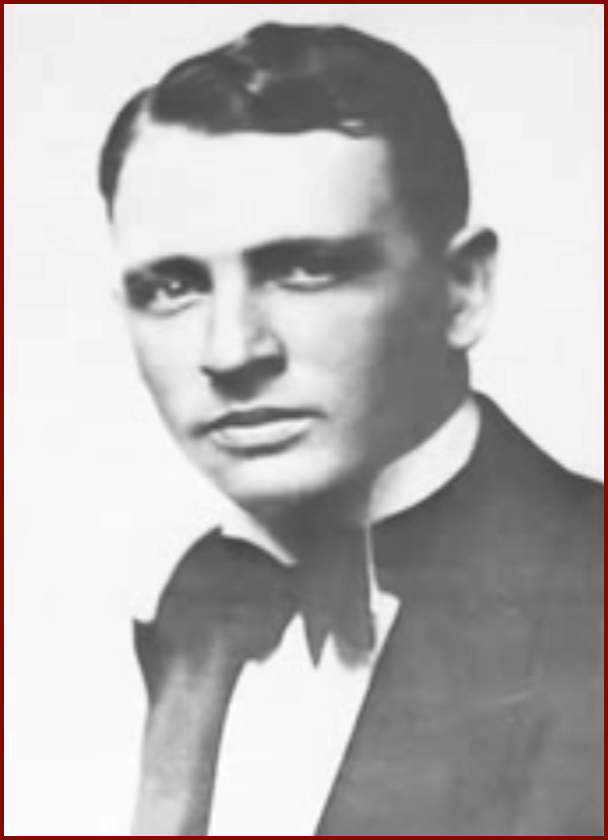 Over the next several years Milton attended school, but dropped out periodically to help support the family by working with his father.
As a result of this sporadic school attendance, he did not graduate from Arlington Heights High School until he was 22 years of age in 1925.
He was not sure what direction his talents would take him, but he was sure that he wanted to make his living in music. Although Barty
Brown was an accomplished fiddle player and Milton's brothers both became musicians, Milton never showed an interest in any musical
expression besides singing.
Over the next several years Milton attended school, but dropped out periodically to help support the family by working with his father.
As a result of this sporadic school attendance, he did not graduate from Arlington Heights High School until he was 22 years of age in 1925.
He was not sure what direction his talents would take him, but he was sure that he wanted to make his living in music. Although Barty
Brown was an accomplished fiddle player and Milton's brothers both became musicians, Milton never showed an interest in any musical
expression besides singing.
By 1927 Brown was singing with his good Fort Worth friends Roy McBride and and Ellis Fagan in a group called the Rock Island Rockets. Advertised on the local Fort Worth radio and in the Fort Worth Star Telegram newspaper, the group received good responses at their harmonizing performances around town for various organizations and businesses. Before long, young Derwood started playing guitar with his brother at some of the singing engagements.
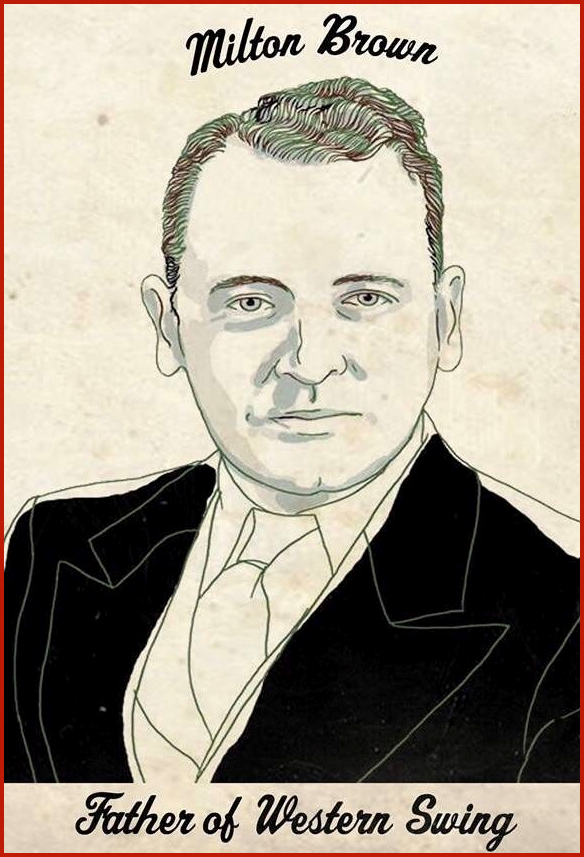 Milton then met West Texas fiddler Bob Wills and his guitarist Herman Arnspiger in the spring of 1930 at a Fort Worth house dance. They were
equally impressed with one another and immediately formed a trio, the Wills Fiddle Band, which played every Saturday night at the Eagles' Fraternal
Hall in downtown Fort Worth. After Wills won a fiddle contest in the summer of 1930 the band added Milton's brother Derwood on rhythm guitar and
they became the Aladdin Laddies, performing on Fort Worth's KFJZ and WBAP radio stations. The group also played to great success at the Crystal
Springs Dance Pavilion, a popular dance hall a few miles west of downtown Fort Worth. Brown and Wills then hired tenor banjoist Clifton "Sleepy"
Johnson and a second fiddler, Jesse Ashlock, to fill out the band's sound. With the help of friends and fans in Fort Worth, Wills and Brown
persuaded W. Lee O'Daniel, general sales manager of Burrus Mills and Elevator Company, to sponsor the group under their new name, "The Light
Crust Doughboys", on a KFJZ radio show by advertising the mill's Light Crust Flour. The program and the band's live Crystal Springs dance
performances became a huge success over the next two years, but in the fall of 1932, when O'Daniel jealously ordered the band to quit playing
at Crystal Springs and placed other controlling restrictions on the group, Brown and his brother Derwood, along with fiddler Jesse Ashlock,
pianist Fred "Papa" Calhoun and banjo player Ocie Stockard decided to leave the Doughboys to launch "Milton Brown and the Musical Brownies".
Milton then met West Texas fiddler Bob Wills and his guitarist Herman Arnspiger in the spring of 1930 at a Fort Worth house dance. They were
equally impressed with one another and immediately formed a trio, the Wills Fiddle Band, which played every Saturday night at the Eagles' Fraternal
Hall in downtown Fort Worth. After Wills won a fiddle contest in the summer of 1930 the band added Milton's brother Derwood on rhythm guitar and
they became the Aladdin Laddies, performing on Fort Worth's KFJZ and WBAP radio stations. The group also played to great success at the Crystal
Springs Dance Pavilion, a popular dance hall a few miles west of downtown Fort Worth. Brown and Wills then hired tenor banjoist Clifton "Sleepy"
Johnson and a second fiddler, Jesse Ashlock, to fill out the band's sound. With the help of friends and fans in Fort Worth, Wills and Brown
persuaded W. Lee O'Daniel, general sales manager of Burrus Mills and Elevator Company, to sponsor the group under their new name, "The Light
Crust Doughboys", on a KFJZ radio show by advertising the mill's Light Crust Flour. The program and the band's live Crystal Springs dance
performances became a huge success over the next two years, but in the fall of 1932, when O'Daniel jealously ordered the band to quit playing
at Crystal Springs and placed other controlling restrictions on the group, Brown and his brother Derwood, along with fiddler Jesse Ashlock,
pianist Fred "Papa" Calhoun and banjo player Ocie Stockard decided to leave the Doughboys to launch "Milton Brown and the Musical Brownies".

Because Milton's career was tragically cut short in 1936, his Musical Brownies band has not been exactly remembered as a household name, except perhaps among a few old-timers in Texas and Oklahoma who remember dancing to their innovative music during those exciting short four years.
Although the Brownies enjoyed unprecedented regional popularity in their day and virtually invented the wonderful hybrid known as Western Swing, their legacy has not fared well in subsequent years. Their music has proved too jazzy and swinging to win them a prominent place in the annals of country music, too "hillbilly" to be taken seriously by jazz scholars, too full of regional quirks to be accepted as mainstream pop. Where does that leave them?
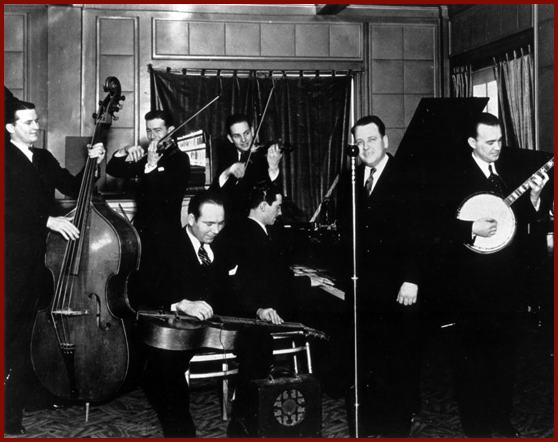 Well, among other things, it would be no exaggeration to call the Brownies one of the most important, and most unjustly obscure, of the
predecessors and forefathers of rock and roll. They were white dudes boppin' the blues, influenced more by Big Bill Broonzy, Memphis Minnie,
Cab Calloway, and even Duke Ellington than by any country music artist. They boasted the very first electric guitarist ever recorded in their
gonzo lap-steel man Bob Dunn. They had the beat, courtesy of a classic rhythm section, and they popularized the percussive slap bass style,
which passed from the Brownies' Wanna Coffman to Bob Wills' Texas Playboys, who passed it on Bill Haley & the Comets, to Elvis' original
bassist, Bill Black. In many ways, the Brownies' most potent secret weapon was Milton Brown himself. He was an exceptional and innovative
bandleader, forging a highly distinctive ensemble style while borrowing from anywhere and everywhere. He was also one of the first truly
comprehensive American song stylists. Brown could, and did, sing just about everything, from straight pop to sentimental old ballads, heartfelt
blues to jazzy hipster jive, cowboy songs to country hoe-downs. Not only was he likely to follow an utterly idiomatic "Joe Turner Blues" with
"The Sweetheart of Sigma Chi," he sang them both with equal fervor. At the time, there was nobody to compare him to; the figure repeatedly
reminded of when listening to Brown's impressive chops, natural feel, and inclusive stylistic grasp is Elvis Presley.
Well, among other things, it would be no exaggeration to call the Brownies one of the most important, and most unjustly obscure, of the
predecessors and forefathers of rock and roll. They were white dudes boppin' the blues, influenced more by Big Bill Broonzy, Memphis Minnie,
Cab Calloway, and even Duke Ellington than by any country music artist. They boasted the very first electric guitarist ever recorded in their
gonzo lap-steel man Bob Dunn. They had the beat, courtesy of a classic rhythm section, and they popularized the percussive slap bass style,
which passed from the Brownies' Wanna Coffman to Bob Wills' Texas Playboys, who passed it on Bill Haley & the Comets, to Elvis' original
bassist, Bill Black. In many ways, the Brownies' most potent secret weapon was Milton Brown himself. He was an exceptional and innovative
bandleader, forging a highly distinctive ensemble style while borrowing from anywhere and everywhere. He was also one of the first truly
comprehensive American song stylists. Brown could, and did, sing just about everything, from straight pop to sentimental old ballads, heartfelt
blues to jazzy hipster jive, cowboy songs to country hoe-downs. Not only was he likely to follow an utterly idiomatic "Joe Turner Blues" with
"The Sweetheart of Sigma Chi," he sang them both with equal fervor. At the time, there was nobody to compare him to; the figure repeatedly
reminded of when listening to Brown's impressive chops, natural feel, and inclusive stylistic grasp is Elvis Presley.
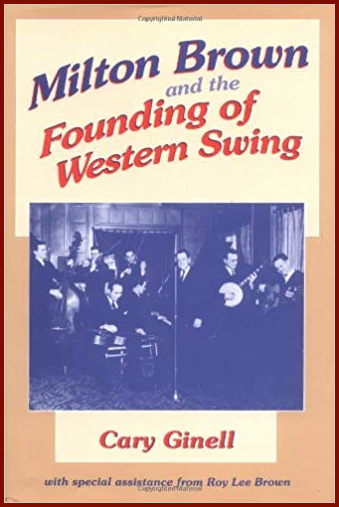 Just being able to listen to Milton Brown's music, in all its prolific glory, comes as an unexpected treat. Thankfully there exists over
100 Musical Brownies' vintage recordings, all collected on indie label and imported vinyl reissues that are themselves long out of print.
With Brown being generally ignored by both country music and jazz scholars, and little-known among pop and rock aficionados, a major Brownies
reissue seemed unlikely, to say the least. So hats off to music researcher Cary Ginell for what appears to be something of a one-man crusade
on behalf of the Milton and his Brownies' heritage. With invaluable assistance & recollection from Milton's youngest brother - Roy Lee Brown,
Ginell's biography, Milton Brown and the Founding Of Western Swing, is an in-depth labor of love to set the record straight for an almost
forgotten bandleader extraordinaire. And best of all, the book's back jacket flap announced that "the complete recordings of Milton Brown
and his Musical Brownies were finally being offered on compact disc, and referred interested parties to Texas Rose Records. Thankfully the
Complete Recordings of the Father of Western Swing have been painstaking re-mastered and preserved.
Just being able to listen to Milton Brown's music, in all its prolific glory, comes as an unexpected treat. Thankfully there exists over
100 Musical Brownies' vintage recordings, all collected on indie label and imported vinyl reissues that are themselves long out of print.
With Brown being generally ignored by both country music and jazz scholars, and little-known among pop and rock aficionados, a major Brownies
reissue seemed unlikely, to say the least. So hats off to music researcher Cary Ginell for what appears to be something of a one-man crusade
on behalf of the Milton and his Brownies' heritage. With invaluable assistance & recollection from Milton's youngest brother - Roy Lee Brown,
Ginell's biography, Milton Brown and the Founding Of Western Swing, is an in-depth labor of love to set the record straight for an almost
forgotten bandleader extraordinaire. And best of all, the book's back jacket flap announced that "the complete recordings of Milton Brown
and his Musical Brownies were finally being offered on compact disc, and referred interested parties to Texas Rose Records. Thankfully the
Complete Recordings of the Father of Western Swing have been painstaking re-mastered and preserved.
The Brownies, it turns out, recorded some 102 tunes under Milton's leadership, all first takes by a super-tight working band, all issued at the time on 78s that sold primarily in the southwest. In addition, the Brownies box of five CDs includes the two earliest recordings of the Western Swing genre, when when in 1930 Milton and Texas State Champion Fiddler Bob Wills formed the Fort Worth Doughboys. These two 1931 recordings, "Sunbonnet Sue" and "Nancy Jane", are a rare lasting capture of the dawn of this beloved fusion of music genres.
Over the years, Wills has received most of the credit for pioneering Western Swing. In terms of his band leadership, influence, stage presence, longevity and song writing success (not to mention his own musical innovations, such as introducing drums, brass horns and reed instruments that were beautifully arranged with Western hot string instruments), Wills deserves his reputation and accolades as the "King Of Western Swing".
But the title "Father of Western Swing" properly belongs to Milton Brown. Brown's fiddler, the classically-trained Cecil Brower, His jazz pianist Fred "Papa" Calhoun and the wildly innovative Bob Dunn would all launch into improvised "take-off" riffs that literally drove dancing audiences wild at Fort Worth's Crystal Springs Dance Pavilion.
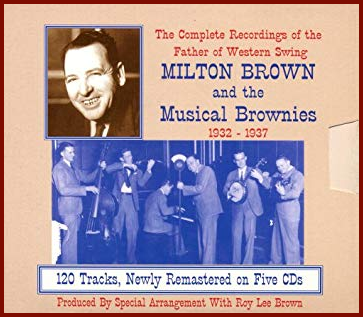 By late 1935, when Bob Wills and the Texas Playboys made their first recordings, Milton Brown and the Brownies had already recorded more
than half of their 102 issued sides, at two sessions in San Antonio and two in Chicago. The first 18 performances were made before the
arrival of steel guitar firebrand Bob Dunn, but even without his formidable solos the band was astonishing. At a time when the instrumentation
of the rhythm section as we know it today had not yet become standardized, Brown had hit on a combination of players that looks downright
eccentric on paper but worked like a charm in real life. The heartbeat of the Brownies came from Ocie Stockard's chopping banjo, Derwood
Brown's rhythm guitar, Wanna Coffman's robustly slapped and pummeled string bass, and the driving left hand of the Earl Hines-influenced
pianist Fred "Papa" Calhoun. These four men seem to have fused their collective playing into a single, mighty engine of rhythm, their
individual parts interlocking as deftly as the cross-rhythms of then popular country-blues guitar teams like Memphis Minnie and Kansas
Joe, who were among the many blues artists the Brownies covered. (Others ranged from the Mississippi Sheiks to Big Bill Broonzy to Bessie
Smith). Add to this churning rhythm section two "hot" twin fiddlers, Cecil Brower and Jessie Ashlock (who played with the Texas Playboys
after Milton's death), plus Milton Brown's jazzy/bluesy stand-up vocals, and you had a powerpacked unit, even without the steel guitar.
By late 1935, when Bob Wills and the Texas Playboys made their first recordings, Milton Brown and the Brownies had already recorded more
than half of their 102 issued sides, at two sessions in San Antonio and two in Chicago. The first 18 performances were made before the
arrival of steel guitar firebrand Bob Dunn, but even without his formidable solos the band was astonishing. At a time when the instrumentation
of the rhythm section as we know it today had not yet become standardized, Brown had hit on a combination of players that looks downright
eccentric on paper but worked like a charm in real life. The heartbeat of the Brownies came from Ocie Stockard's chopping banjo, Derwood
Brown's rhythm guitar, Wanna Coffman's robustly slapped and pummeled string bass, and the driving left hand of the Earl Hines-influenced
pianist Fred "Papa" Calhoun. These four men seem to have fused their collective playing into a single, mighty engine of rhythm, their
individual parts interlocking as deftly as the cross-rhythms of then popular country-blues guitar teams like Memphis Minnie and Kansas
Joe, who were among the many blues artists the Brownies covered. (Others ranged from the Mississippi Sheiks to Big Bill Broonzy to Bessie
Smith). Add to this churning rhythm section two "hot" twin fiddlers, Cecil Brower and Jessie Ashlock (who played with the Texas Playboys
after Milton's death), plus Milton Brown's jazzy/bluesy stand-up vocals, and you had a powerpacked unit, even without the steel guitar.
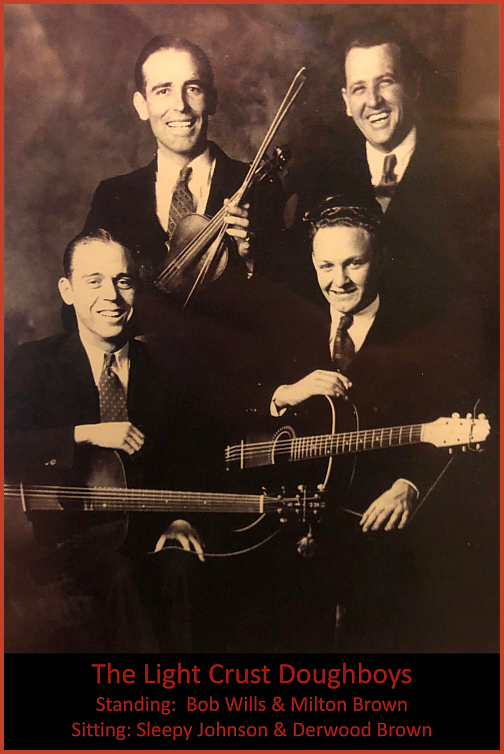 While cutting the first of their eighteen earliest
sides, the Brownies quickly learned to relax in the studio - fortunately, since they
were allowed one take per tune! Brower and Calhoun made good use of their plentiful solo opportunities, but the one band member who sounded
from the very beginning like a man who was born to make records was Milton Brown himself. His vocals on these early sessions are marvels of
musicality, warmth, projection, and the rare ability to negotiate a variety of musical idioms while retaining an identifiably personal sound
and style. In particular, these sides include some of Brown's most impressive blues singing - "Joe Turner Blues," Luis Rusell's swinging
novelty, "The Call of the Freaks" (retitled "Garbage Man Blues"), and superb renditions of bluesballads such as "Corrine Corrine" and "Sitting
On Top of the World." (The Brown titles are "Where You Been So Long Corrine" and "Just Sitting On Top of the World"). On these and later
blues performances such as "Texas Hambone Blues" and the rocking, rolling, irresistible "Easy Ridin' Papa" and "Oh, You Pretty Woman", Brown
displayed a big, bold shouter's voice, reminiscent of fellow southwestern blues shouters such as Jimmy Rushing and, especially, Big Joe Turner.
But even when he was shouting, Brown was also altering melody lines, displacing accents, and otherwise improvising on the material at hand,
in the manner of the better jazz singers.
While cutting the first of their eighteen earliest
sides, the Brownies quickly learned to relax in the studio - fortunately, since they
were allowed one take per tune! Brower and Calhoun made good use of their plentiful solo opportunities, but the one band member who sounded
from the very beginning like a man who was born to make records was Milton Brown himself. His vocals on these early sessions are marvels of
musicality, warmth, projection, and the rare ability to negotiate a variety of musical idioms while retaining an identifiably personal sound
and style. In particular, these sides include some of Brown's most impressive blues singing - "Joe Turner Blues," Luis Rusell's swinging
novelty, "The Call of the Freaks" (retitled "Garbage Man Blues"), and superb renditions of bluesballads such as "Corrine Corrine" and "Sitting
On Top of the World." (The Brown titles are "Where You Been So Long Corrine" and "Just Sitting On Top of the World"). On these and later
blues performances such as "Texas Hambone Blues" and the rocking, rolling, irresistible "Easy Ridin' Papa" and "Oh, You Pretty Woman", Brown
displayed a big, bold shouter's voice, reminiscent of fellow southwestern blues shouters such as Jimmy Rushing and, especially, Big Joe Turner.
But even when he was shouting, Brown was also altering melody lines, displacing accents, and otherwise improvising on the material at hand,
in the manner of the better jazz singers.
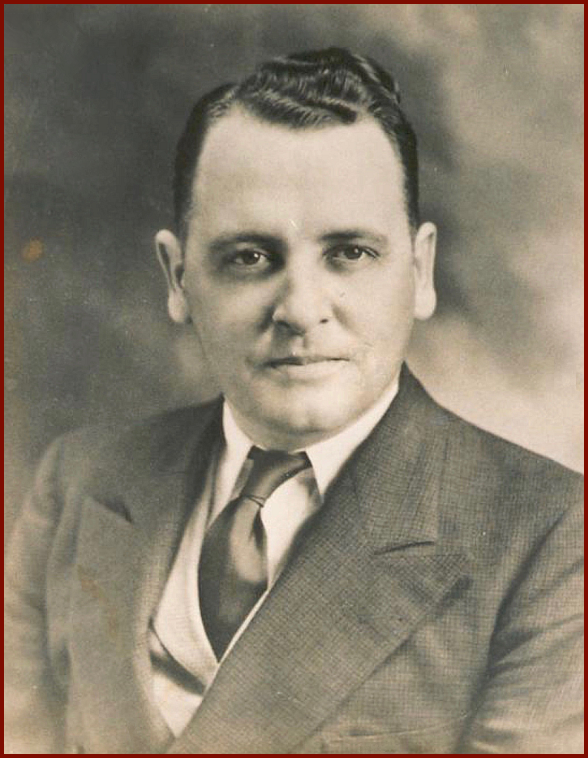 And one really cool thing about Milton's Musical Brownies recordings was the hit-and-run nature of the original sessions; there's no
repetition of alternate takes as on so many box sets, and the music moves along with all the momentum and spontaneity of a dancehall set.
Knocking off one first take after another, the Brownies kept their interest up by following fast hoe-downs with strutting jazz tunes,
sentimental ballads with adults-only blues and boogie, making for captivating listening on CD. If you have any affection for this kind
of music, and don't get too upset over the occasional lapse into mawkish sentimentality or minstrel-show racial stereotypes, you'll find
Milton's varied songs to be the most consistently listenable sets of music recordings you're likely to encounter.
And one really cool thing about Milton's Musical Brownies recordings was the hit-and-run nature of the original sessions; there's no
repetition of alternate takes as on so many box sets, and the music moves along with all the momentum and spontaneity of a dancehall set.
Knocking off one first take after another, the Brownies kept their interest up by following fast hoe-downs with strutting jazz tunes,
sentimental ballads with adults-only blues and boogie, making for captivating listening on CD. If you have any affection for this kind
of music, and don't get too upset over the occasional lapse into mawkish sentimentality or minstrel-show racial stereotypes, you'll find
Milton's varied songs to be the most consistently listenable sets of music recordings you're likely to encounter.
Fort Worth's Famed "Father of Western Swing" - Milton Brown, tragically died from injuries sustained in an auto accident on Jacksboro Hwy when he crashed his 1936 Pontiac Silver Streak into a telephone pole located directly across the street from the old "Avalon Motel" (shown in the photo below). Milton's brother Derwood stated it was perhaps a sad premonition, that one of Milton's most requested songs was "Avalon".
